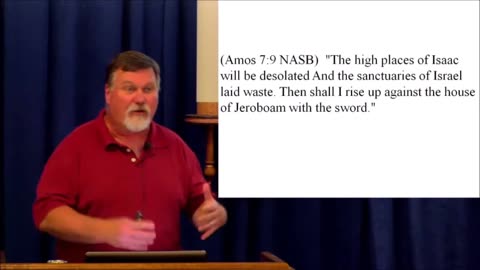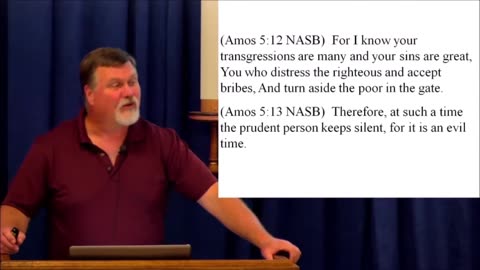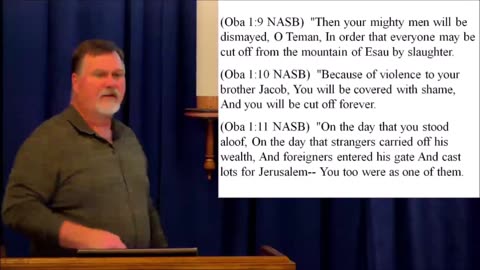-
Amos 9 Plowman will overtake the reaper; same message - Daniel, Ezekiel, and Jeremiah – regathering.
 RVTAAmos 9:13 "Behold, days are coming," declares the LORD, "When the plowman will overtake the reaper And the treader of grapes him who sows seed; When the mountains will drip sweet wine, And all the hills will be dissolved. The days are coming when the plowman will overtake the reaper. Death will no longer be the order of the day. The land of Israel will once again be glorious (Ezek 36:35-36, Hos. 2:21-23). When He returns, the hills will melt (Amos 9:5). The mountains and islands will be devastated (Rev 6:14, 16:19-20). Amos 9:14 "Also I will restore the captivity of My people Israel, And they will rebuild the ruined cities and live in them, They will also plant vineyards and drink their wine, And make gardens and eat their fruit. The regathering of the people will happen when Messiah returns (Psalm 53:6, Jer 30:3, 18-22). The people will gather their own food and drink their own wine. Their enemies will no longer rule over them (Isa 62:8-9). Amos 9:15 "I will also plant them on their land, And they will not again be rooted out from their land Which I have given them," Says the LORD your God. Elohim will plant them in their land and they will never again be uprooted from it (Isa 60:21, Jer 24:6-7. Ezek 34:28-30, 37:25-26). The regathering speaks of the return of Messiah and of the resurrection of the righteous. It will be a glorious time of celebration and of praising the name of Yahweh. River Valley Torah Assembly [email protected]15 views
RVTAAmos 9:13 "Behold, days are coming," declares the LORD, "When the plowman will overtake the reaper And the treader of grapes him who sows seed; When the mountains will drip sweet wine, And all the hills will be dissolved. The days are coming when the plowman will overtake the reaper. Death will no longer be the order of the day. The land of Israel will once again be glorious (Ezek 36:35-36, Hos. 2:21-23). When He returns, the hills will melt (Amos 9:5). The mountains and islands will be devastated (Rev 6:14, 16:19-20). Amos 9:14 "Also I will restore the captivity of My people Israel, And they will rebuild the ruined cities and live in them, They will also plant vineyards and drink their wine, And make gardens and eat their fruit. The regathering of the people will happen when Messiah returns (Psalm 53:6, Jer 30:3, 18-22). The people will gather their own food and drink their own wine. Their enemies will no longer rule over them (Isa 62:8-9). Amos 9:15 "I will also plant them on their land, And they will not again be rooted out from their land Which I have given them," Says the LORD your God. Elohim will plant them in their land and they will never again be uprooted from it (Isa 60:21, Jer 24:6-7. Ezek 34:28-30, 37:25-26). The regathering speaks of the return of Messiah and of the resurrection of the righteous. It will be a glorious time of celebration and of praising the name of Yahweh. River Valley Torah Assembly [email protected]15 views -
Amos 7&8 It wasn’t an eclipse; don’t fall for that. The documented detestable acts of the Assyrians.
 RVTAAmos 8:9 "And it will come about in that day," declares the Lord GOD, "That I shall make the sun go down at noon And make the earth dark in broad daylight. This appears to refer to an eclipse. Usher has shown that about eleven years after Amos prophesied there were two great eclipses of the sun, one at the feast of tabernacles, and the other some time around the Passover. However, that is probably not what this verse is referring to. It says He will make the sun go down at noon and make the earth dark in broad daylight. That sudden darkness in the middle of the day probably refers to sudden death. River Valley Torah Assembly13 views
RVTAAmos 8:9 "And it will come about in that day," declares the Lord GOD, "That I shall make the sun go down at noon And make the earth dark in broad daylight. This appears to refer to an eclipse. Usher has shown that about eleven years after Amos prophesied there were two great eclipses of the sun, one at the feast of tabernacles, and the other some time around the Passover. However, that is probably not what this verse is referring to. It says He will make the sun go down at noon and make the earth dark in broad daylight. That sudden darkness in the middle of the day probably refers to sudden death. River Valley Torah Assembly13 views -
Amos 3&4 - Undeniable description of who the Heavenly Fathers Chosen people are; through Scripture.
 RVTAAmos 3:1 Hear this word which the LORD has spoken against you, sons of Israel, against the entire family which He brought up from the land of Egypt, Amos 3:2 "You only have I chosen among all the families of the earth; Therefore, I will punish you for all your iniquities." The rebuke of Israel continues. But this is not only against the northern kingdom of ten tribes. It is the "children of Israel, against the whole family which I brought up from the land of Egypt." "You only have I chosen among the families of the earth." Who are His "chosen?" What is Elohim referring to in this passage? He is referring to His people of Israel (Deut.7:6, 10:15-16, 26:18, 1 Peter 2:9). The only people chosen by Elohim is the nation of Israel (Matt. 15:24). Since He has only known Israel, He says "therefore I will punish you for all your iniquities." Elohim does not change. Will he punish the church today for promoting iniquity? Yes He will (Rev. 18:2-8). This passage in Revelation has a quote from the Tanakh "for she says in her heart, 'I SIT as A QUEEN AND I AM NOT A WIDOW, and will never see mourning.' This whole passage about the whore of Babylon (Rev. 17-18) is a parallel passage to the one we find in Isaiah 47. He will still punish us for all our iniquities. We should be mindful of this and remain obedient to His name. Amos 3:3 Do two men walk together unless they have made an appointment? Amos 3:4 Does a lion roar in the forest when he has no prey? Does a young lion growl from his den unless he has captured something? Amos 3:5 Does a bird fall into a trap on the ground when there is no bait in it? Does a trap spring up from the earth when it captures nothing at all? Amos is using these cause-and-effect analogies to establish his right and duty to prophesy. Just as sure as these things do not happen for no reason, Amos is not prophesying for no reason. The two men walking together are probably Elohim and Amos. They had an appointment. That appointment was to pronounce judgment on Israel. Amos 3:6 If a trumpet is blown in a city will not the people tremble? If a calamity occurs in a city has not the LORD done it? Amos says that trumpet is sounding and the people should tremble. The source of the calamity to come is Yahweh. Amos 3:7 Surely the Lord GOD does nothing Unless He reveals His secret counsel To His servants the prophets. Elohim is not doing anything that the people have not been warned about. He is fair and just. He does not punish without warning from His prophets. Before the flood, it is obvious that Enoch, Methuselah, and Noah warned of the coming disaster, but no one would listen. John the Baptist warned the people of the arrival of the kingdom of heaven. Amos is now warning Israel of coming calamity. They should heed the warning of Elohim. We should do the same. Amos 3:8 A lion has roared! Who will not fear? The Lord GOD has spoken! Who can but prophesy? Amos has no choice but to prophesy on what Elohim has spoken. Amos 3:9 Proclaim on the citadels in Ashdod and on the citadels in the land of Egypt and say, "Assemble yourselves on the mountains of Samaria and see the great tumults within her and the oppression's in her midst. Amos 3:10 "But they do not know how to do what is right," declares the LORD, "these who hoard up violence and devastation in their citadels." The people do not know how to do what is right. However, it is not because they weren't told and warned. River Valley Torah Assembly [email protected]24 views 1 comment
RVTAAmos 3:1 Hear this word which the LORD has spoken against you, sons of Israel, against the entire family which He brought up from the land of Egypt, Amos 3:2 "You only have I chosen among all the families of the earth; Therefore, I will punish you for all your iniquities." The rebuke of Israel continues. But this is not only against the northern kingdom of ten tribes. It is the "children of Israel, against the whole family which I brought up from the land of Egypt." "You only have I chosen among the families of the earth." Who are His "chosen?" What is Elohim referring to in this passage? He is referring to His people of Israel (Deut.7:6, 10:15-16, 26:18, 1 Peter 2:9). The only people chosen by Elohim is the nation of Israel (Matt. 15:24). Since He has only known Israel, He says "therefore I will punish you for all your iniquities." Elohim does not change. Will he punish the church today for promoting iniquity? Yes He will (Rev. 18:2-8). This passage in Revelation has a quote from the Tanakh "for she says in her heart, 'I SIT as A QUEEN AND I AM NOT A WIDOW, and will never see mourning.' This whole passage about the whore of Babylon (Rev. 17-18) is a parallel passage to the one we find in Isaiah 47. He will still punish us for all our iniquities. We should be mindful of this and remain obedient to His name. Amos 3:3 Do two men walk together unless they have made an appointment? Amos 3:4 Does a lion roar in the forest when he has no prey? Does a young lion growl from his den unless he has captured something? Amos 3:5 Does a bird fall into a trap on the ground when there is no bait in it? Does a trap spring up from the earth when it captures nothing at all? Amos is using these cause-and-effect analogies to establish his right and duty to prophesy. Just as sure as these things do not happen for no reason, Amos is not prophesying for no reason. The two men walking together are probably Elohim and Amos. They had an appointment. That appointment was to pronounce judgment on Israel. Amos 3:6 If a trumpet is blown in a city will not the people tremble? If a calamity occurs in a city has not the LORD done it? Amos says that trumpet is sounding and the people should tremble. The source of the calamity to come is Yahweh. Amos 3:7 Surely the Lord GOD does nothing Unless He reveals His secret counsel To His servants the prophets. Elohim is not doing anything that the people have not been warned about. He is fair and just. He does not punish without warning from His prophets. Before the flood, it is obvious that Enoch, Methuselah, and Noah warned of the coming disaster, but no one would listen. John the Baptist warned the people of the arrival of the kingdom of heaven. Amos is now warning Israel of coming calamity. They should heed the warning of Elohim. We should do the same. Amos 3:8 A lion has roared! Who will not fear? The Lord GOD has spoken! Who can but prophesy? Amos has no choice but to prophesy on what Elohim has spoken. Amos 3:9 Proclaim on the citadels in Ashdod and on the citadels in the land of Egypt and say, "Assemble yourselves on the mountains of Samaria and see the great tumults within her and the oppression's in her midst. Amos 3:10 "But they do not know how to do what is right," declares the LORD, "these who hoard up violence and devastation in their citadels." The people do not know how to do what is right. However, it is not because they weren't told and warned. River Valley Torah Assembly [email protected]24 views 1 comment -
Amos 5&6 -What does it mean to "Seek Him?" For thus says the LORD to the house of Israel, "Seek Me.
 RVTAAmos 5:4 For thus says the LORD to the house of Israel, "Seek Me that you may live. This is one last warning for the people. Elohim does not want to judge Israel. He does not enjoy judgment and devastation (Ezek. 33:11). Turning to Him is their only hope to avoid complete destruction. He gives the same warnings in other parts of Scripture also Isa 55:6-8). What does it mean to "seek Him?" There are many places in Scripture where is says that His people will seek Him. When that happens, is says that He will restore them to the land, bless them in all that they do, and they will all keep His Torah. It sounds like the Scriptures say that when His people seek Him, that this is the time of the resurrection (Deut. 30:1-8). River Valley Torah Assembly [email protected]24 views
RVTAAmos 5:4 For thus says the LORD to the house of Israel, "Seek Me that you may live. This is one last warning for the people. Elohim does not want to judge Israel. He does not enjoy judgment and devastation (Ezek. 33:11). Turning to Him is their only hope to avoid complete destruction. He gives the same warnings in other parts of Scripture also Isa 55:6-8). What does it mean to "seek Him?" There are many places in Scripture where is says that His people will seek Him. When that happens, is says that He will restore them to the land, bless them in all that they do, and they will all keep His Torah. It sounds like the Scriptures say that when His people seek Him, that this is the time of the resurrection (Deut. 30:1-8). River Valley Torah Assembly [email protected]24 views -
Amos 1&2 Before the earthquake? What earthquake?? Uzziah was the king in the days of Amos.
 RVTAAmos 1:1 The words of Amos, who was among the sheepherders from Tekoa, which he envisioned in visions concerning Israel in the days of Uzziah king of Judah, and in the days of Jeroboam son of Joash, king of Israel, two years before the earthquake. Amos means "burdened." Amos's heart was heavily burdened for the cause of Yahweh and the plight of the people. Clearly Amos was not a "professional" prophet like the numerous institutional or cultic prophets of his day. He comes from the southern kingdom of Judah at Tekoa, six miles south of Bethlehem. Amos insisted that he was a common man. He did not consider himself to be a fancy orator and theologian. He says he was called by Elohim to go to the northern kingdom to be His spokesman Amos 7:15). The date of the writing of Amos is about 760 B.C. The reference in 1:1 to the reigns of Uzziah (of Judah) and Jeroboam II (of Israel), who reigned concurrently from 792 to 753 B.C., gives a general time period. The exact time of the earthquake is not known, but it was significant enough to become a point of reference for Amos. Amos speaks of the certainty of Judgment. He is a forerunner of three other eighth-century prophets: Hosea, Micah, and Isaiah. Each message from Amos is a message of judgment and also a call to repentance. Amos began by pronouncing judgment on the nations that surrounded Israel geographically. He then focused on Israel, predicting and interpreting the judgments of Yahweh upon them. Although the theme of judgment is common throughout the nine chapters, Amos does have brief passages of hope and predictions of restoration. River Valley Torah Assembly http://rvtorah.com/52 views 1 comment
RVTAAmos 1:1 The words of Amos, who was among the sheepherders from Tekoa, which he envisioned in visions concerning Israel in the days of Uzziah king of Judah, and in the days of Jeroboam son of Joash, king of Israel, two years before the earthquake. Amos means "burdened." Amos's heart was heavily burdened for the cause of Yahweh and the plight of the people. Clearly Amos was not a "professional" prophet like the numerous institutional or cultic prophets of his day. He comes from the southern kingdom of Judah at Tekoa, six miles south of Bethlehem. Amos insisted that he was a common man. He did not consider himself to be a fancy orator and theologian. He says he was called by Elohim to go to the northern kingdom to be His spokesman Amos 7:15). The date of the writing of Amos is about 760 B.C. The reference in 1:1 to the reigns of Uzziah (of Judah) and Jeroboam II (of Israel), who reigned concurrently from 792 to 753 B.C., gives a general time period. The exact time of the earthquake is not known, but it was significant enough to become a point of reference for Amos. Amos speaks of the certainty of Judgment. He is a forerunner of three other eighth-century prophets: Hosea, Micah, and Isaiah. Each message from Amos is a message of judgment and also a call to repentance. Amos began by pronouncing judgment on the nations that surrounded Israel geographically. He then focused on Israel, predicting and interpreting the judgments of Yahweh upon them. Although the theme of judgment is common throughout the nine chapters, Amos does have brief passages of hope and predictions of restoration. River Valley Torah Assembly http://rvtorah.com/52 views 1 comment




